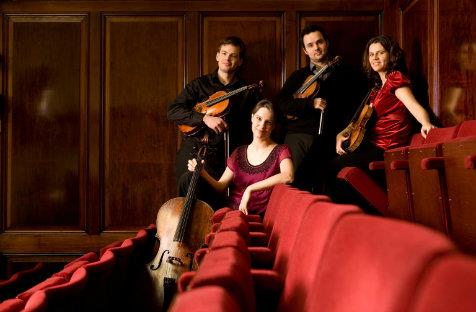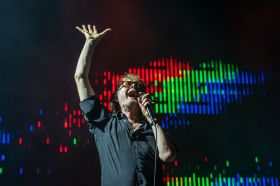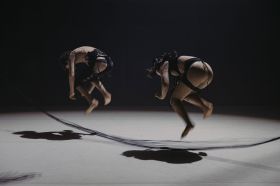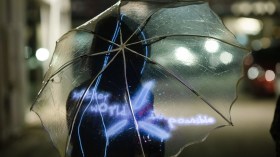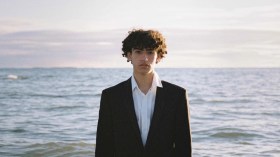I can’t tell you what I know. Which may strike you, dear reader, as a curious position for a critic to be in, but it is a position that I’ve resigned myself to. You see, I’ve been forbidden to speak or write about why I saw, heard, or read, the afternoon of Musica Viva’s latest concert with the Elias String Quartet. Mind you, it’s not the concert that I can’t talk about, but rather what happened beforehand. There was a launch of 2014’s season, for selected guests only, of which this critic had the honour of being one. John Bell – perhaps not the first person you’d think of when the name ‘Musica Viva’ is mentioned, was there to give a little speech about his love for chamber music, as was Artistic Director Carl Vine, who launched it all. Fun was had by all. Information was exchanged. Superiority, over the poor souls who don’t yet know what 2014 has in store, was felt. Wonderful all round. I’m excited for the 2014 season, and hopefully, once it is launched proper, and I no longer have to seal my lips about it all, you will be too. It launches on Tuesday 27th August.
Carl Vine took to the stage of the City Recital Hall, too, to tease the audience with what he (and now I) knew. But let us not, dear reader, look to the future and miss the present, for the Elias String Quartet was to perform. They’re from the United Kingdom, and the come to Australia with high acclaim, mostly lived up to on the night I saw them; they weren’t exactly stellar – and one is always more confident in such an assessment after having the privilege of hearing such beauties as the Mahler Chamber Orchestra and the Australian Chamber Orchestra of late – but they were generally both balanced and energetic, with a bit of vim that can often lack in chamber concerts.
We began with Haydn’s String Quartet in F major, op 77 no 2, or rather we began with a high-pitched whining noise and then heard the Haydn over the top of it. This whining noise – I suspect it was part of the audio system in the hall, which must have been live considering that Carl Vine was speaking into a microphone beforehand – basically, in effect, ruined the piece. Music is often as much about silence as it is about sound, so if one is listening to a string quartet, and the players aren’t making any noise, yet there is a whining to fill the gap, a whining that re-enters your consciousness after you having forgotten about it during the louder parts of the music, a whining that never lets up, a whining that destroys any semblance of a musical void (think how Clair de Lune would sound with a drone in the background, or a gymnopedie of Satie), a whining that goes on and on, a whining, a whining, a whining – then one might understand how it could ruin it all, yes? Obviously I exaggerate as to its deleterious effect on the music – it didn’t destroy the experience – but it kept one’s attention on the surface, and the performance, which was on the whole quite good, wasn’t given the chance it deserved.
I can’t remember if the whining had stopped before the next piece by Matthew Hindson was begun, but thankfully it had stopped by the end. Commissioned by Julian Burnside (who said something rather humorous about how commissioning is like an arranged marriage: ‘You meet on the day, and can only hope that you will fall in love’), the world premiere of Matthew Hindson’s String Quartet no 2 was a welcome event. Inspired in part by the chaos of the universe and exploding supernovae, and also in part by the ‘white heat’ of scientific discovery, it is a taut work that deals in tensions, a bit of creepiness (a la Brett Dean), and an undeniable beauty. Played in one movement, it is the slow section, which starts off with far too much void/silence (how often have you been to a concert where the space between notes is over generous?), but, once it gets into its stride, is magnificently poignant and striking. One imagines that the piece will be remembered for this most of all.
After the interval was Beethoven’s String Quartet no 8 in E minor, op 59 no 2 ‘Razumovsky’, which was much the same in quality as the Haydn, but without the whining, was much more gladly received. Two encores – or one encore of two songs in a row – were introduced by violinist Donald Grant in a Scottish accent, and thus I’ve no idea what songs they were, apart from them being Scottish folk. They were, however, brilliant, and possibly the best part of the night, with the first plumbing melancholy like only a fiddle can do, and the second bringing us back to joy.
Rating: 4 stars out of 5
Elias String Quartet
Musica Viva
Sara Bitlloch (violin), Donald Grant (violin), Martin Saving (viola), Marie Bitlloch (cello)
Joseph Haydn – String Quartet in F major, op 77 no 2
Matthew Hindson – String Quartet no 2 (World Premiere)
Ludwig van Beethoven – String Quartet on 8 in E minor, op 59, no 2 ‘Razumovsky’
City Recital Hall, Sydney
19 August

